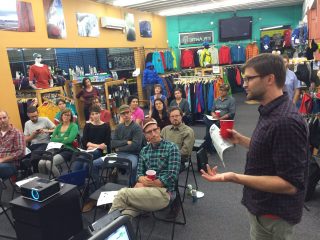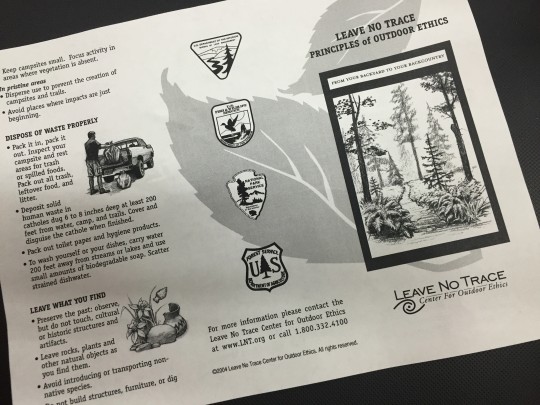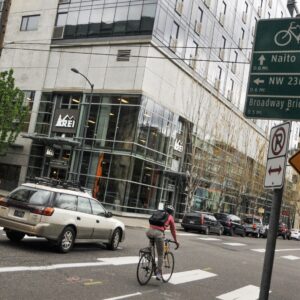Leave No Trace ethics aren’t something we talk much about in the bike world. But we should.
As “gravel riding” and “bikepacking” skyrocket in popularity, everyone promoting it (I’m raising my hand) has a responsibility to make sure people who do it act with care and consideration for each other and the places they visit.
It was in that spirit that I joined Jocelyn Gaudi from the Komorebi Cycling Team, Gabe Tiller of Limberlost, and Donnie Kolb of Velo Dirt and OregonBikepacking.com last night at Mountain Shop. Our event came on the heels of two major bits of bad publicity last year: Donnie’s frustrated rant after people left trash and human waste along the Oregon Outback route and the story of that guy in Idaho who caused a wildfire after using flames to dispose of his soiled toilet paper.
In front of about two dozen people (over half of which were women, encouragingly) we set out to right those wrongs. I’m a dwarf among those three giants of adventure riding, so I spent most on the night just trying to soak up all their wisdom and insights.
Here’s what I learned:
Human Waste
— Peeing on rocks is preferable to going on trees or shrubs because it’s less likely to attract wildlife — some of which, as in the case of mountain goats apparently, are so eager to lick up your salty urine they sometimes don’t even wait for you to finish before lapping it up.
— A small and lightweight trowel is a must-have when you need to go poop. Dig a “cathole” 6-8 inches (“It’s deeper than you think,” Jocelyn said last night), do your business, then cover it back up with the dirt.
— If possible, just wait until you can use a real toilet in the next town you come to.
— Consider carrying a plastic bag with some kitty litter in it. Or, carry a few Ziploc bags: one for your trowel, one for soiled TP, one for fresh TP.
— There are also lightweight, ready-to-go plastic bag kits you can get from an outdoor store. Mountain Shop sells the Cleanwaste brand.
Advertisement
Food Waste
— Before you leave, repackage all your food stuff into Ziploc bags so you avoid all the original packaging.
— Don’t wash dishes in streams or lakes. Use a spatula or rag to remove the big chunks and carry a screen that allows you to put them in a trash bag.
— Try not to have any food waste to begin with. “How do you do that?” Jocelyn asked Gabe. “Just eat everything!” he replied with a smile.
— Or, if you are really hardcore, swish a bit of water around on your dirty dishes… then drink it up!
— Tiny silicone spatulas or good, old-fashioned tortillas are both good for wiping dishes clean without using water.
Campfires
— Consider not having one. During a recent burn ban, Jocelyn said she and friends were forced to sit in the darkness. And it was actually quite nice.
— Don’t burn anything in the fire except wood. And maybe coffee grounds (which is all Gabe burns). No plastic or food labels or beer cans.
— Use water to put out the flames, not dirt or rocks. Embers can remain under soil.
— If you’re in a place with lots of loamy soil or organic matter, wipe it all away before starting your fire. One person from the audience shared that he once accidentally started a ground fire that popped up several feet away from the original one because the ground was so full of flammable material.
— Don’t create new fire pits. Use existing ones. Or better yet, build your fire on a shoreline when possible or on a rock — places where you can wipe it away and leave no trace when you’re done.
Isn’t all this stuff just common sense? One guy spoke up last night and made a good point: “The problem with common sense is that we don’t all have common experiences.” What he meant was that we can’t assume everyone just knows how to act in nature because we all come from different backgrounds.
Another thing that has stuck with me from last night is something Jocelyn said: “Great campsites aren’t made, they’re found.”
The general idea when you’re out and about is to leave places exactly like they were when you found them. Or in some cases, leave them looking better than when you found them.
Last night’s event was the start of a new conversation about the importance of Leave No Trace that we all hope continues as the adventure riding season heats up again next spring. Speaking of which, we’re already planning a larger event at Mountain Shop in May. Stay tuned.
And thanks to everyone who came out last night. I have a feeling #leavenotrace will be the hot hashtag next spring.
— Jonathan Maus
jonathan@bikeportland.org
(503) 706-8804
@BikePortland









Thanks for reading.
BikePortland has served this community with independent community journalism since 2005. We rely on subscriptions from readers like you to survive. Your financial support is vital in keeping this valuable resource alive and well.
Please subscribe today to strengthen and expand our work.
Jonathan, thank you so much for this advice. My impact on the beauty of Oregon’s backcountry may be small but our collective impact can be devastating. It’s not just me as a backpacker or cyclist, it’s me plus a gazillion others like me. Add in the effects of ever more powerful ATV’s that can go anywhere, logging roads that should have been closed decades ago, an increasing population and climate change, then we might as well kiss off the Oregon we love. Please, may all of us be respectful of wild lands.
Probably because I started backpacking just before the drought of ’75-76 in California (what was formerly known simply as THE drought), but I’m always shocked and dismayed that people do fires. It’s disgusting and dangerous.
And what was that thing about scattering bits of food waste in the water? I surely hope no one is putting anything in the water. It looks like all the hype about nature deficit syndrome has some validity and is a more serious problem than I ever realized.
Shocked that people do fires? There are perfectly appropriate places and times to have a fire.
And almost none of them leave no trace, which is kind of the point here. In fact, I have more than once had to extinguish underground fires from other people’s careless campfires. Also, if anyone else happens to be anywhere nearby, the soot is less than enjoyable for folks with lungs.
Yes, I know the default norm in the PNW is to burn, but it still strikes me as backwards and I accept that this is because of my background. The norm for transportation also involves nonenzymatic oxidation, and I also find that somewhat shocking. Again, my background comes into play, having lived where/when driving wasn’t the norm.
People have been cooking with fire for a million years.
Evolve, dude, and pack a stove rather than cooking over a fire. There were a lot fewer of us a million years ago trying to recreate in the same space.
people had been cooking with fire because if they didn’t their food would kill them… we’ve evolved past that… nothing I’ve eaten in the last 5 years has required cooking… but it’s nice to have something warm sometimes…
“It’s disgusting and dangerous.”
Tell that to Prometheus.
The Greek Isles aren’t exactly forested, now are they?
California has a 12 year drought cycle, and every time it happens it is catastrophic and unforeseen. Then it is ended by the excessive rains of an El Nino year and thus the rainfall averages are maintained. This has happened for not only the 250 years of measurable data but for many millennia previously. What is amazing to me is that for each of us, whatever the weather was when we were teenagers is what we see as “normal”. That is a very narrow perspective!
Exactly right; however, the droughts are getting worse – not because of the changes in the drought cycles, but because there are more people in California, and more of the land is developed. There is more demand for the limited water resources California has.
About that scattering food in the water… I meant that after you screen out the bits/chunks of food, I thought I heard it was OK to then scatter the remaining water used for cleaning the dishes into the water.
LNT master trainer here… don’t put cleaning water back in streams or lakes even when you strain it.
Thanks Mary (and others!). Now I know. I will edit the post accordingly.
because our food is bad for wildlife?
yes, our food is bad for wildlife – both behaviorally and nutritionally. And adding ‘dish water” to the stream degrades water quality.
Yeah, I think Jocey said to screen and pack out the large chunks and then scatter the water (on the ground).
Take in kitty kitty litter, pee in that, and pack it out? Drink your dishwater? C’mon guy’s you’re going way too far here.
Been backpacking for almost as long as B. Carfree.
Agree, no food in the water. Normally, I use freeze dried food in the mylar pouches. Just boil water, pour it in, wait 10 or 15 minutes, eat it all, then close it back up and put the empty pouch in a trash bag that you keep with your food. No food waste.
No fires if you are not in a “campground”. Backpackers normally are not in a “campground”. Use a stove – MSR Pocket Rocket is one that is light, inexpensive, and works.
http://www.rei.com/product/660163/msr-pocketrocket-backpacking-stove
For toilet paper, poop in the 6″ deep cat hole – can be dug with an ice axe or a boot heel if you are wearing sturdy boots. When done, put the paper in the hole, push it down in the hole with a small stick, then pee on the paper, and cover it all up with the dirt you removed to make the hole. Then put a small stack of rocks on top so people know not to dig there.
For those who like getting out in nature I do recommend backpacking. You cannot be in truly wild areas bike packing – bikes are not allowed in Congressionally designated wilderness areas. You will find that most of the trails are not suitable for bikes anyway.
I’ve always washed, pooped/pee 200ft from any water source.
I always include the ten essentials and Leave no trace principles in all the classes I teach at work. Day hikes, basic snowshoeing, bike maintaince. Because you know what, everybody poops and sometimes you hiked 10 miles into forest park and you just gatta go. Carry the toilet paper back out and be considerate, breakfast burritos aren’t always the smartest breakfast choice. 10 essentials because you never know when you might experience an emergency.
This is exactly the information the horde of nascent Pacific Crest Trail Mexico to Canada bikepackers need before they head out on the trail. Ride easy, and leave no trace.
That and KTFO the PCT.
Leave No Trace, Center for Outdoor Ethic, is the non-profit that champions this campaign nationally. https://lnt.org/ They have a wide variety of educational opportunities – most for free and some for a fee. There are about 30 “master” LNT educators in Oregon, including yours truly. Some are volunteers while other are professional guides that include LNT into their services. NOLS (National Outdoor Leadership School) and the federal land management agencies (NPS, USFS, BLM, USFW…) where key players in the formation of this non-profit. The practices that LNT teaches have been vetted.
A second national campaign, called “Tread Lightly” is geared more for raising the bar on outdoor ethics for motorized outdoor recreationalists, while LNT is focused on the non-motorized recreationalists.
Peeing on a rock is the very definition of leaving a trace. If you really want to leave no trace then pack up your urine or drink it.
Think this message will get through to dog owners?
I always bury pet waste just as I would with my own.
I appreciate those here that go the extra mile to diffuse their food waste. The truth is, 99 percent of folks (yes, a verified number) are perfectly happy if you pack our your trash (not burn it), bury your poo and TP in a 6 inch hole far from the site and throw your food scraps somewhere the little bugs and ants will enjoy it out of view.
Just getting all folks to do that would require a massive education campaign. Just this week, I noted beer cans in a spot where trucks hang out to drop loads at Costco. Beer cans…in a parking lot…at a respectable business. Come on. That’s what we are dealing with.
It starts young..training your children to pick up their dishes, to pick up their trash..to pick up their room…to brush their teeth…all that. There are a number of children that were never taught that…and thus think “nobody will notice my trash/poo..out here.
The reality is, we the clean people will need to pick up after the nasty curmudgeons who were dropped on their head as a child. Just deal with it.
Though I haven’t done it years, I use to do a lot of wilderness camping via canoe/portages. It wasn’t uncommon for us to be packing 2+ weeks worth of supplies with us on some of these trips. Out of necessity we were constantly looking for simple items that could be used for multiple purposes.
As an example, we would pack non perishable food (jerky or we’d make pouches for trail mix and the like) in aluminium foil. You could then use the foil once the jerky was eaten for cooking the fish you caught earlier that day and then when the meal is done wad it up and use to clean your dishes.
Though it’s unlikely that you’ll get this remote on a bicycLe I know that in the more wilderness areas there are designated campsites so the “campsites are found” doesn’t always apply – in most wilderness preserves and parks it’s illegal camp anywhere else unless it’s an emergency. These campsites usually have existing and appropriate fire pits and areas to tent up with minimal impact. And if remote enough, these are the areas that the Forest service airplanes fly over more often looking for forest fires and stranded campers.
You may have difficulty getting your kids to finish their food when backpacking and in that case you might have some food waste. I almost never have any food waste unless perhaps something doesn’t taste right – then I may not eat it to avoid getting sick – but that has almost never happened. You should not “diffuse” food waste. There should be no food waste on 99% of trips. Backpackers pack light – they do not take anything they will have to leave behind – especially food – it’s heavy.
What is your definition of “far from the site”? If food waste is unavoidable, I’d prefer to bury food waste to avoid attracting bears ,etc – don’t make a hazard by leaving food where animals can find it. Animals are not supposed to eat human food.
What if all the thousands of backpackers went around throwing their “food waste” out in the bushes? Not a good idea.
Campfires are probably fine when bike-packing where you camp in a campground. Most backpackers don’t make a fire – it’s a hazard – and it leaves an ugly mess in camp – and they should never make a new fire ring. Cooking over a fire is not a good idea – the soot from the fire will make a nasty black mess on your cook pot. Get a stove.
Agree with all that you said Dead Salmon… spot on… except the burying food part. If you can bury it, an animal will find it. The answer is – pack out excess food waste. Your overall approach – no leftovers – is the best.
If you want a campfire got to the campground that has them.
Leave the rest of nature to real Men and Women who prefer a clean environment.
Great article, Jonathan. Generally followed these guidelines when I was working for Rivendell, and doing a lot of S240s (sub-24 hour overnights), but I didn’t know about peeing on rocks. Staring today, I’m swearing off of trees.
This was mostly in regards to alpine environments (where bikes usually aren’t) and how the animals there particularly crave sodium. So you’re probably fine sticking to trees. 😉
A big part of my upbringing was to leave the place better than you found it. Not only clean-up after yourself, but try to remove anything unnatural that has been left by others. Bottle caps, shell casings, candy wrappers, etc. Having a wilderness Karma.
>> as in the case of mountain goats apparently, are so eager to lick up your salty urine they sometimes don’t even wait for you to finish before lapping it up.
Damn, them goats are fast to get between you and your target 🙂
I was taught to pee as high up a tree as possible to deter predators… they’ll think you’re large and avoid you…
I often find myself acting as a defacto groundskeeper in all of our natural spaces. I go as far as to bring trash bags for others. And can we convince people to either bag their dog poo and carry it home, or bury dog poo. It drives me nuts to see bagged poo sitting along side a trail. If one goes to trouble to bag it, double bag it and carry to to the garbage please.
Thanks for chiming in everyone! Seems like there’s plenty of anti-fire folks here, which is fine: I’ve spent many nights without one too. But bikepacking isn’t backpacking and most places I’ve camped while on my bike already have a campfire ring. I have no problem cleaning out the inevitable burnt trash, enjoying a small fire, and stirring the wet ashes when I’m done. The fact of the matter is most people will have fires, and most will do it irresponsibly. We can at least try to teach more responsible fire stewardship to those folks and even suggest trying to go without one sometime.
The fact that this article needed a line about no beer cans…says something about the current state of humanity.